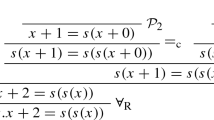Abstract
Equality handling has always been a traditional weakness of tableau calculi because the typical refinements of those calculi were not compatible with the most successful methods for equality handling. The disconnection tableau calculus represents a new confluent framework well suited for the integration of a large class of different methods for equality handling, as we demonstrate in this paper. We consider both saturation based and goal-oriented methods for equality handling. We also show how specialized equality handling can affect the properties of the calculus at the example of the well-known regularity condition. All the presented approaches of equality handling have been implemented in the theorem prover DCTP and we present the results of an experimental evaluation.
Preview
Unable to display preview. Download preview PDF.
Similar content being viewed by others
References
L. Bachmair, N. Dershowitz, and D.A. Plaisted. Completion Without Failure. In H. Ait-Kaci and M. Nivat, editors, Resolution of Equations in Algebraic Structures, volume 2, pages 1–30. Academic Press, 1989.
Bernhard Beckert. Rigid E-unification. In Wolfgang Bibel and Peter H. Schmitt, editors, Automated Deduction — A Basis for Applications, volume I: Foundations, pages 265–289. Kluwer, Dordrecht, 1998.
Leo Bachmair and Harald Ganzinger. Equational reasoning in saturation-based theorem proving. In Wolfgang Bibel and Peter H. Schmidt, editors, Automated Deduction: A Basis for Applications. Volume I, Foundations: Calculi and Methods, pages 353–398. Kluwer Academic Publishers, Dordrecht, 1998.
Jean-Paul Billon. The disconnection method: a confluent integration of unification in the analytic framework. In P. Migliolo, U. Moscato, D. Mundici, and M. Ornaghi, editors, Proceedings of the 5th International Workshop on Theorem Proving with analytic Tableaux and Related Methods (TABLEAUX), volume 1071 of LNAI, pages 110–126, Berlin, May 15–17 1996. Springer.
Daniel Brand. Proving theorems with the modification method. SIAM Journal on Computing, 4(4):412–430, 1975.
Vincent J. Digricoli and Malcolm C. Harrison. Equality-based binary resolution. Journal of the ACM, 33(2):253–289, April 1986.
Martin Giese. A model generation style completeness proof for constraint tableaux with superposition. In Proc. International Conference on Automated Reasoning with Analytic Tableaux and Related Methods, Copenhagen, Denmark, LNCS. Springer-Verlag, 2002. To appear.
Jean H. Gallier and Wayne Snyder. Complete sets of transformations for general E-unification. Theoretical Computer Science, 67:203–260, 1989.
Thomas Genet and Valérie Viet Tirem Tong. Reachability Analysis of Term Rewriting Systems with timbuk. In Andrei Voronkov, editor, Proceedings of the 8th International Conference on Logic for Programming and Automated Reasoning (LPAR 2001), Havanna, Cuba, pages 695–706. Springer, Berlin, December 2001.
D.E. Knuth and P.B. Bendix. Simple Word Problems in Universal Algebras. In J. Leech, editor, Computational Algebra, pages 263–297. Pergamon Press, 1970.
Don W. Loveland. Automated theorem proving: A logical basis. North Holland, New York, 1978.
Reinhold Letz and Gernot Stenz. DCTP: A Disconnection Calculus Theorem Prover. In Rajeev Goré, Alexander Leitsch, and Tobias Nipkow, editors, Proceedings of the International Joint Conference on Automated Reasoning (IJCAR-2001), Siena, Italy, volume 2083 of LNAI, pages 381–385. Springer, Berlin, June 2001.
Reinhold Letz and Gernot Stenz. Proof and Model Generation with Disconnection Tableaux. In Andrei Voronkov, editor, Proceedings of the 8th International Conference on Logic for Programming and Automated Reasoning (LPAR 2001), Havanna, Cuba, pages 142–156. Springer, Berlin, December 2001.
Max Moser, Ortrun Ibens, Reinhold Letz, Joachim Steinbach, Christoph Goller, Johann Schumann, and Klaus Mayr. SETHEO and E-SETHEO— The CADE-13 Systems. Journal of Automated Reasoning, 18(2):237–246, April 1997.
F. Oppacher and E. Suen. HARP: A tableau-based theorem prover. Journal of Automated Reasoning, 4:69–100, 1988.
David A. Plaisted and Shie-Jue Lee. Eliminating duplication with the hyper-linking strategy. Journal of Automated Reasoning, 9(1):25–42, 1992.
G. A. Robinson and L. Wos. Paramodulation and theorem proving in first-order theories with equality. Machine Intelligence, 4:135–150, 1969.
Author information
Authors and Affiliations
Editor information
Editors and Affiliations
Rights and permissions
Copyright information
© 2002 Springer-Verlag Berlin Heidelberg
About this paper
Cite this paper
Letz, R., Stenz, G. (2002). Integration of Equality Reasoning into the Disconnection Calculus. In: Egly, U., Fermüller, C.G. (eds) Automated Reasoning with Analytic Tableaux and Related Methods. TABLEAUX 2002. Lecture Notes in Computer Science(), vol 2381. Springer, Berlin, Heidelberg. https://doi.org/10.1007/3-540-45616-3_13
Download citation
DOI: https://doi.org/10.1007/3-540-45616-3_13
Published:
Publisher Name: Springer, Berlin, Heidelberg
Print ISBN: 978-3-540-43929-5
Online ISBN: 978-3-540-45616-2
eBook Packages: Springer Book Archive




